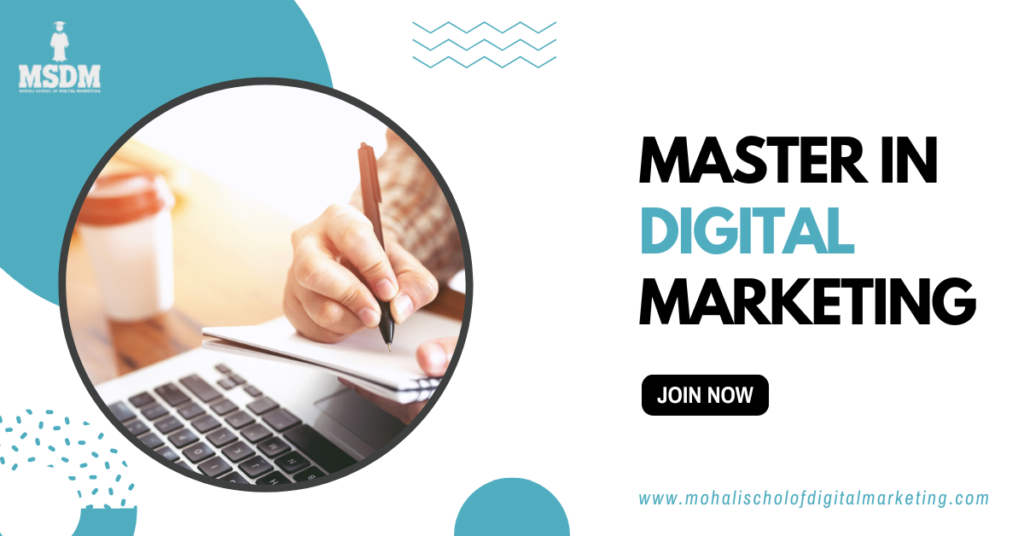Introduction
In the quickly changing digital world of today, digital marketing plays a more important role than before. Companies are always looking for new and creative ways to connect with and involve their customers. Getting a Master in Digital Marketing can be a game-changer for people who want to be in leadership positions in this fast-paced industry. In addition to offering a thorough understanding of the subtleties of digital marketing, this advanced degree gives professionals the abilities and know-how required to succeed in a variety of professions. We’ll talk about the advantages of obtaining a Master in Digital Marketing as well as what to expect from the course curriculum in this blog.
Understanding the Master in Digital Marketing Content
A master in digital marketing usually covers a variety of topics intended to provide students a thorough understanding of digital marketing tactics and resources. Here is a closer look at the curriculum’s main elements:
- Digital Marketing Strategy: The fundamentals of developing successful digital marketing strategy are covered in this course. You’ll get knowledge on how to create integrated marketing strategies, evaluate market trends, and comprehend consumer behavior. The focus of this course is on strategic planning and thinking, so you will be able to develop campaigns that complement overarching corporate objectives.
- Content Marketing: In the digital age, content is king, and this course will teach you how to produce engaging content that draws in and keeps your target audience interested. You’ll investigate a range of content types, including infographics, videos, and blog entries as well as social media updates. The training will also discuss content distribution techniques to increase impact and reach.
- SEO and SEM:To drive visitors to digital platforms, search engine marketing (SEM) and search engine optimization (SEO) are essential. The nuances of pay-per-click (PPC) advertising, on-page and off-page SEO strategies, and keyword research are all covered in this course. Gaining an understanding of these components can help you optimize paid advertising efforts and raise your search engine rankings.
- Social Media Marketing:Modern marketing techniques require the use of social media platforms. Using social media sites like Facebook, Instagram, Twitter, and LinkedIn to increase brand awareness, audience engagement, and conversion rates is the main goal of this course. Additionally, you will examine analytics techniques for gauging the success of social media efforts.
- Email Marketing:Email is still a very effective marketing tool, even in the age of emerging new communication mediums. Best practices for audience segmentation, campaign performance analysis, and email campaign creation are covered in this course. You’ll discover how to write communications that compel readers to take action.
- Analytics and Data-Driven Marketing: Data is extremely useful in the digital age. You will learn how to analyze marketing data in this course and apply it to your decision-making. You’ll learn how to analyze ROI, track campaign performance, and modify strategy in response to new information by utilizing analytics tools.
- Mobile Marketing: Mobile marketing is becoming more and more crucial as smartphone use increases. This course examines methods for interacting with mobile users, such as SMS campaigns, app marketing, and mobile-friendly website design. You’ll discover how to make campaigns and content mobile-friendly.
- E-commerce Marketing: This course, which caters to individuals interested in online retail, focuses on tactics for increasing sales via e-commerce platforms. Customer journey mapping, product listing tactics, and conversion rate optimization are just a few of the subjects you’ll study.
- Digital Advertising:This course explores a variety of digital advertising formats, such as native, video, and display ads. To properly reach your audience, you’ll learn about ad development, campaign management, and targeting possibilities.
Benefits of a Master in Digital Marketing
There are several benefits to getting a master in digital marketing, both personally and professionally. The following are some main advantages:
- Enhanced Career Opportunities:Advanced roles in digital marketing, such as social media director, SEO specialist, digital marketing manager, and content strategist, may become available with a master’s degree. It may also provide doors to careers in allied industries like e-commerce and analytics.
- Increased Earning Potential:Graduates of a Master’s program in digital marketing typically fetch greater pay than individuals with only undergraduate degrees or experience because of their enhanced abilities and competence. Gaining specialized expertise might make you a valued asset to companies, which could result in increased pay.
- Up-to-Date Knowledge:The environment of digital marketing is always evolving due to new trends and technologies.
- Networking Opportunities:Graduate programs frequently offer chances to network with peers, alumni, and business professionals. These networking activities can be very helpful for mentorship, job placement, and career progress.
- Hands-On Experience: Practical elements including projects, case studies, and internships are a common feature of Master in digital marketing degrees.
- Leadership Skills: The advanced program develops leadership and strategic thinking in addition to improving technical proficiency.
- Personal Growth:Earning a Master in digital marketing degree requires a major commitment that promotes personal development. It puts you to the test in terms of critical thinking, time management, and juggling work and school obligations. As a result, you gain resilience and confidence.
Conclusion
In essence, a Master’s in Digital Marketing not only prepares you to navigate the complexities of the digital world but also empowers you to lead with confidence and innovation. Whether you’re aiming to elevate your current career or shift into a new role, this degree provides the expertise and credentials needed to achieve your professional goals and drive success in the ever-evolving digital marketplace.

